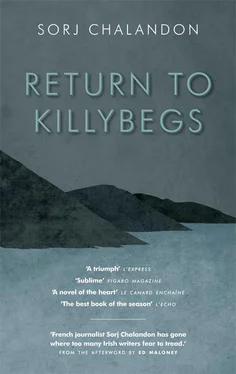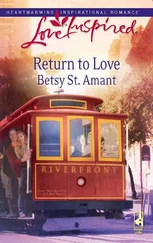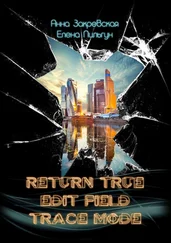The IRA had descended on his parents’ place during the night. He had secretly gone back to live in their house. He was sleeping off his beer, stretched out fully clothed on his childhood bed. Our men were wearing balaclavas. The mother intervened, shouting; the father took up a chair to defend his son.
— Don’t touch the parents! Mickey had ordered.
Two of our guys dragged the delinquent down the stairs. I was standing well back in the street. I wasn’t in charge of the operation. I didn’t like these punishments. We were an army, not the law. Our role was to chase out the British, not to give louts a hiding. But our people demanded safety on our streets.
Mickey was waiting at the door with two others. The mother pounced on him and lifted his mask. He pushed her off and she fell to the ground, pointing her finger.
— It’s Frank Devlin! I know you, Frank Devlin!
She was screeching.
Lights were being switched on all over the place. The guy was brought in a car to the little square beside his victim’s street. He tried to defend himself. Mickey smacked him violently in the temple with the butt of his gun. He tied him to a lamp post by the neck and the belly, his chest bare. A woman arrived, running, handed a sign that read ‘Rapist’ to one of our guys and then left as quickly as she’d come. The IRA hung the sign around his neck. His chest was smeared with cold tar. He seemed to be unconscious, his head dangling back. There were shadows at the windows, ghosts on the footpath, silhouettes on the steps of open doorways.
— Our country is at war! roared Mickey so he’d be heard by the street.
An óglach cocked his gun. The crack of metal in the silence. On the first floor of a house, a man put his fingers in his ears.
— We will not tolerate any attack against our community. Nor any violence against the women who are part of it!
The soldier shot twice. Not in the knees, but in the thighs. We had decided that the convicted man would walk again. He let out a long cry. His head fell back down.
— IRA! IRA! chanted a distant voice.
A combatant collected the burning cartridges with gloved hands and we withdrew.

The rapist’s parents were detested in the community. The postman would purposefully forget them, their bottle of milk would be smashed against their door in the mornings. The bars would refuse to serve the father, the bingo players would leave the mother sitting by herself at a table. They were the bad family of the street. They no longer had anything to lose. So they lodged a complaint with the RUC. And they gave them Mickey.
The mood of the city was black and forlorn as a raven. The sky, the expressions, everything smacked of sadness. Sadness for Mickey, for his wife. And I was sad, too. For the first time, I was disgusted to feel the effects of the practised British duplicity. Wherever I went, the conversations, the faces and the silences brought home the horror of Mickey’s torture over and over. But also, besides all that, the disappointing fact that Mickey hadn’t toughed it out. The British had let it be known that he’d talked. Their press had a field day with it. Waldner was protecting me. The handler was protecting me. They had diverted suspicion. Frank Devlin was arrested one month after I pronounced his name. An eternity. I hadn’t betrayed. I was exhausted. I treated myself to a respite. A last illusion of innocence.

In the third envelope, received on 5 August, were two plane tickets to Paris and an advance of £350 to pay for my first trip. I was to meet ‘Honoré’ at the riverboat wharf. I’d only seen him once, during that first visit to France with Sheila and the handlers playing the couple. He was a true Englishman, not even a gruff Protestant from our parts. He looked at me the way you look at a traitor. He didn’t shake my hand. He stayed the time it took to drink a beer, his eyes on my pink triangle. He wasn’t any more cordial with the MI5 agent or the RUC man. He was young, thirty-five at most. All he knew of Belfast was from flying over the city in a helicopter. He observed me, studied me. He told me he was interested in Sinn Féin, not the IRA. Our party, not our army. With his chin, he nodded at the other two, saying that bombs were their department.
— I don’t know much about politics, I told him.
— You know who thinks what in your movement. Which leaders are slowing down or in the process of gaining power. You know that, Tenor?
I shrugged. Yeah, sure. That I knew.
— Because that’s what interests me, you see. And since I find it a little difficult to attend your meetings…
Then he left the table, saluting us with his rolled-up newspaper to his temple.
I didn’t like him. I felt he was forcing his way into my story. The handler and the agent used to almost reassure me. We shared a common story now. They knew my ways, I knew their manners. We all knew where we stood. Not that there was understanding, but neither was there hatred. One day, the handler told me that he would oppose my ideas to the death, but that he respected them. As he gave me my tickets for Paris, Waldner admitted he would have liked to have met me in another place and time. Were they lying? Both of them? Probably. Those words may well have been intended to dull me, possibly pulled from their official handling manual. I didn’t give a damn. I was a prisoner, condemned to lies for life, and these two keepers of mine didn’t add humiliation to my loneliness.
Honoré wasn’t part of this story, he wasn’t even the same kind of enemy. He was a sheep stealer who takes advantage of an open gate. He was going to come along after the others and press me like a fruit. He had the pallor of a civil servant. He had ink on his hands, not blood. I could picture him under his desk lamp, drawing out flow charts with his mouth half-open and his tongue sticking out. For him, our country was a chart, our combat a statistic. We weren’t men and women but laboratory rats. The handler had us in his rifle sight, whereas Honoré observed us under a microscope. He called me Tenor. I hoped that he didn’t know anything about me, or Danny, or the existence of Jack and Sheila. That I remained anonymous. A synonym for traitor. A code name.
He was certainly going to make me hate Paris.
18. Killybegs, Tuesday, 2 January 2007
— Is that enough? Antoine asked.
— There’s never enough, I answered.
The wee Frenchman was laden down with wood. He was carrying the damp branches like a kid from the village. It had snowed during the night, but everything had frozen by morning. I looked at him for a moment, curved over a cumbersome branch as though afraid of damaging his clothes. I turned a log, he raised his head and our eyes met.
Earlier, when Sheila had dropped him in front of the house, he had looked at the big fir tree, my father’s house, my country’s sky, but he avoided my eyes and I didn’t search out his. I locked the door, turned my back on him and set off walking towards the wood, my axe at my shoulder.
— We’ll get some wood for the fire.
And he followed me.
I was dreading that look. And yet I was curious, too.

I hadn’t seen Antoine since 10 July 2006. I had brought him to the Kesh. Since the peace process, the prison camp had been deserted. Like Jack, the last prisoners of war had been freed six years earlier. What remained were the buildings, the watchtowers, the walls topped by barbed wire and the traces left behind by all of us.
Читать дальше













